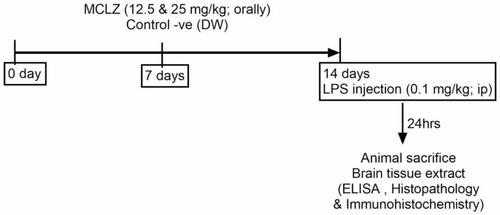Metabolic Brain Disease ( IF 3.6 ) Pub Date : 2023-09-21 , DOI: 10.1007/s11011-023-01295-3 Rasha E Mostafa 1 , Gihan F Asaad 1

|
Neuroinflammation is identified as significant inflammatory reactions occurring in the central nervous system. Lipopolysaccharide (LPS) stimulates innate immune reactions and is used as an in vivo animal model for the investigation of inflammation. Meclizine (MCLZ) is a histamine antagonist with potential neuroprotective qualities. Forty adult male Swiss albino mice were divided into four groups (n = 10). Group 1 served as a control negative group. Groups 2–4 were injected with LPS (5 mg/kg; i.p). Group 2 served as LPS-control. Groups 3 & 4 were given MCLZ (12.5 & 25 mg/kg; p.o) respectively for 14 days. LPS administration resulted in significant neuroinflammation in mice as was revealed by significant inflammatory histopathological changes and positive immunohistochemical staining of glial fibrillary acidic proteins (GFAP) accompanied by significant elevations of brain tissue contents of interleukin-1-beta (IL-1β), tumor necrosis factor-alpha (TNF-α), nuclear factor kappa-beta (NF-κβ), protein kinase B (AKT), extracellular signal-regulated kinase (ERK) and C-Jun N-Terminal Kinases (JNK). MCLZ treatment significantly down-regulated all the aforementioned parameters in mice brains. Moreover, MCLZ treatment ameliorated the inflammatory histopathological changes and GFAP immunostaining in brain tissues. The current study identifies for the first time the protective anti-neuroinflammatory effects of MCLZ against LPS-induced neuroinflammation in mice. MCLZ protected against neuroinflammation via the amelioration of inflammatory histopathological changes as well as neuronal GFAP immunostaining and down-regulated the AKT/NF-κβ/ERK/JNK signaling pathway. MCLZ is anticipated as a potential protective candidate for the addition to the treatment protocol of neuroinflammation.
中文翻译:

Meclizine 通过调节 AKT/NF-κβ/ERK/JNK 信号通路减轻脂多糖诱导的小鼠神经炎症
神经炎症被认为是中枢神经系统中发生的显着炎症反应。脂多糖 (LPS) 可刺激先天免疫反应,可用作研究炎症的体内动物模型。Meclizine (MCLZ) 是一种组胺拮抗剂,具有潜在的神经保护作用。将 40 只成年雄性瑞士白化小鼠分为四组 (n = 10)。第1组作为阴性对照组。第 2-4 组注射 LPS(5 mg/kg;腹膜内注射)。第 2 组作为 LPS 对照。第3组和第4组分别给予MCLZ(12.5和25毫克/千克;口服)14天。LPS 给药导致小鼠出现明显的神经炎症,表现为显着的炎症组织病理学变化和胶质纤维酸性蛋白 (GFAP) 的免疫组织化学染色阳性,并伴有脑组织中白细胞介素 1-β (IL-1β) 含量显着升高、肿瘤坏死α因子 (TNF-α)、核因子 kappa-β (NF-κβ)、蛋白激酶 B (AKT)、细胞外信号调节激酶 (ERK) 和 C-Jun N 末端激酶 (JNK)。MCLZ 治疗显着下调小鼠大脑中的所有上述参数。此外,MCLZ 治疗改善了脑组织的炎症组织病理学变化和 GFAP 免疫染色。目前的研究首次确定了 MCLZ 对 LPS 诱导的小鼠神经炎症的保护性抗神经炎症作用。MCLZ 通过改善炎症组织病理学变化以及神经元 GFAP 免疫染色并下调 AKT/NF-κβ/ERK/JNK 信号通路来预防神经炎症。MCLZ 有望成为神经炎症治疗方案中的潜在保护性候选药物。



























 京公网安备 11010802027423号
京公网安备 11010802027423号